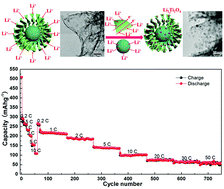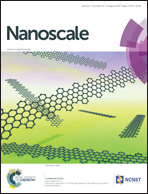Hierarchical nanosheet-constructed yolk–shell TiO2 porous microspheres for lithium batteries with high capacity, superior rate and long cycle capability†
Abstract
A hierarchical nanosheet-constructed yolk–shell TiO2 (NYTiO2) porous microsphere is synthesized through a well-designed, one-pot, template-free solvothermal alcoholysis process using tetraethylenepentamine (TEPA) as the structure directing reagent. Such a yolk–shell structure with a highly porous shell and dense mesoporous core is quite advantageous as an anode material for lithium ion batteries (LIBs). The outer, 2D nanosheet-based porous (15 nm) shell and the nanocrystal-based inner mesoporous (3 nm) core provide a stable, porous framework, effective grain boundaries and a short diffusion pathway for Li+ and electron transport, facilitating lithium insertion/extraction. The voids between the core and the shell can not only store the electrolyte due to capillary and facilitate charge transfer across the electrode/electrolyte interface but also buffer the volume change during the Li+ insertion/extraction. As a result, NYTiO2 demonstrates excellent Li+ capacity with outstanding cycle performance and superior rate capability at different rates for >700 cycles, retaining a 225 mA h g−1 reversible capacity after 100 cycles at 1 C. In particular, the reversible capacity can still be maintained at 113 mA h g−1 after 100 cycles at 10 C. We also observe the formation of homogeneously distributed 5–10 nm Li2Ti2O4 nanocrystallites on the surface of the nanosheets during the discharge–charge process. The synergy of the yolk–shell structure with dual mesopores in the shell and core and the Li2Ti2O4 nanocrystallites endow the hierarchical NYTiO2 with high reversible capacity, excellent rate capability and outstanding cycle performance.


 Please wait while we load your content...
Please wait while we load your content...